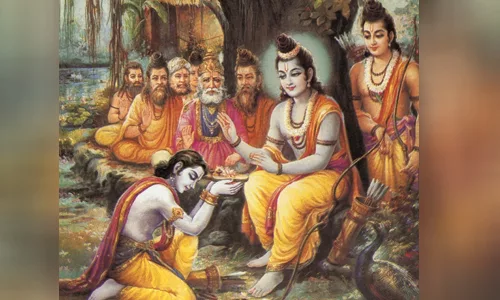 The outcry from the so-called progressive mindset follows this argument:
The outcry from the so-called progressive mindset follows this argument:
“Sri Ram’s temple will not produce jobs or medical doctors; it will produce beggars. It is better to build schools and colleges.”
It has already been calculated that UP will have a turnover exceeding 4 lakh crores. The numbers clearly indicate that wealth has begun to rise.
Sri Rama is not a faqir or a darvesh but a king. His policy has always been that of a prosperous king with dharmik values.
He prioritized governance and the respect of his citizens. Due to this mindset, even Sitadevi had to be sent to Valmiki’s ashram.
His justice system was impeccable, adhering to five principles of justice:
- Definition (Vyakhya)
- Exception (Apavada)
- Explanation (Khulasa, Vishleshana)
- Illustration (Udarana)
- Application (Yojana)
The Raghu dynasty was deeply rooted in the principle of “Tyagaya sambhratarthanam, Satyaya mita bhasinam” emphasizing:
- “Tyaga” focussing less for oneself and more for others
- “Artha sanchaya” for giving and sharing
- Talking less as it has a great chance of being truthful
- Battle for “Kirti” not greed
- Death through yoga-marga not accidental
On the contrary, Materialistic civilization, like Ravana’s, is governed by these five principles:
- Pib (Drink)
- Vihar (Loiter)
- Ramasva (Enjoy)
- Bhunkshya (Eat)
- Bhogan (Gratify)
Ravana wanted to implement a policy of swapping in his kingdom. The treaty agreed upon with Vali included swapping of :
- Darah (Wives)
- Putran (Sons)
- Puram (Towns)
- Rastram (Country)
Imagine that for personal gratification, one could exchange any of the above.
Certainly, both kingdoms faced leadership failures. Improvement in their fortunes only occurred under the reigns of Sugriva in Kishkindha and Vibhishana in Ayodhya.
Sri Rama’s governance is driven by public welfare, student empowerment, and sustaining such a policy with strong character building. Therefore, while discussing with Bharata, Sri Rama, in the form of questions, articulates a clear policy on how the state should run. As mentioned earlier, Sri Rama did not create faqirs and beggars in his kingdom.
Sri Rama’s advice to Bharat included:
- Respecting the Brahman teacher who imparts knowledge on the proper timing of Yagna
- Integrated puja of – devatva, legacy through ancestors, teachers and the elderly, forms the foundation of the kingdom
Does Sri Rama represent prosperity and security concerns of a state or simply poetic ideals of self imposed poverty?
Sri Rama wanted Sudhanva, an expert in Artha shastra and Dhanur vidya, to be respected. He urges Bharat to have ministers who can deliver what is expected of them. This means it is clear that they should not only be virtuous but also competent.
Sri Rama inquired about discussing artha in the night, ensuring he is prepared to execute plans in the morning. So, how can one complain that Sri Rama meant to produce beggars?
Adding to the nuances of governance, Sri Ram warned Bharat that:
- Cruel punishment causes anger amongst citizens
- Extra tax will cause anxiety in citizens
- Commander has to be valorous and affectionate
- Salary has to be given on time because if salary is not given timely, then even loyal servant can become angry
- Ambassador has to be local born and qualified, not coming from some other place
- The legal distinction between rich and poor should be eliminated
Sri Ram further elaborates:
- Keep away nastika from your kingdom. They are the worst in narratives. This nastika makes one self-centered and has no fear of a higher power, hence they will be corrupt and cruel. Sri Rama had no place for such people in the ministry. It is not that the nastika were killed; they were part of the kingdom but not in the ministry.
- Friendship with farmers and traders was highly recommended. Wealth and resources form the foundation for a good life.
- Sri Rama specifically advised keeping women happy, as exploited women can destroy the kingdom through their curses, leading to its ruin.
He asked Bharat, “Are you satisfied with elephants and horses?” That should not be the case. Growing resources for the kingdom is never a sin; it has to increase. It’s not greed but the duty of a king, not through looting or exploiting other kingdoms, but through trade and commerce.
Sri Rama requested Bharat to decorate and give darshan to citizens. How contrasting it is’ that our currency has picture of a poverty centric person. It doesn’t radiate positive energy to depict someone who promoted a life of poverty. Sri Rama’s principle is simplicity but not poverty.
Unfortunately, without Sri Rama’s policy we know how justice is delivered. Sri Rama warned about, “Innocent being punished” which has the power to destroy the king.
One of the most important pieces of advice from Sri Rama was that Dharma should not be destroyed because of Artha and Artha should not be destroyed because of Dharma. This balance of prosperity with dharma forms the foundation of sustainability.
Sri Rama also suggested enjoying things timely. It is highly recommended to read Sri Rama’s instructions to Bharat about governance.
Therefore, Bharat flourished as a prosperous kingdom because our kingdom relatively managed Artha and Dharma based on the principles of Rama Rajya. Conversely, the so-called anti-dharmik policies of socialism and capitalism in Europe have failed miserably.
Similarly, radical faith-centric countries like Pakistan and Afghanistan face troubles with basics. The European world was battered by clergies in the 15th century. However, Bharat managed the harmony between prosperity and Dharma by keeping radical faith away in governance and promoting dharmik faith- prosperity leading to simplicity and sustainability.
Before rambling about Rama Rajya, study the the history and ensure that your numbers are correct and logical.
Jai Sri Rama🙏
– Govinda Das



